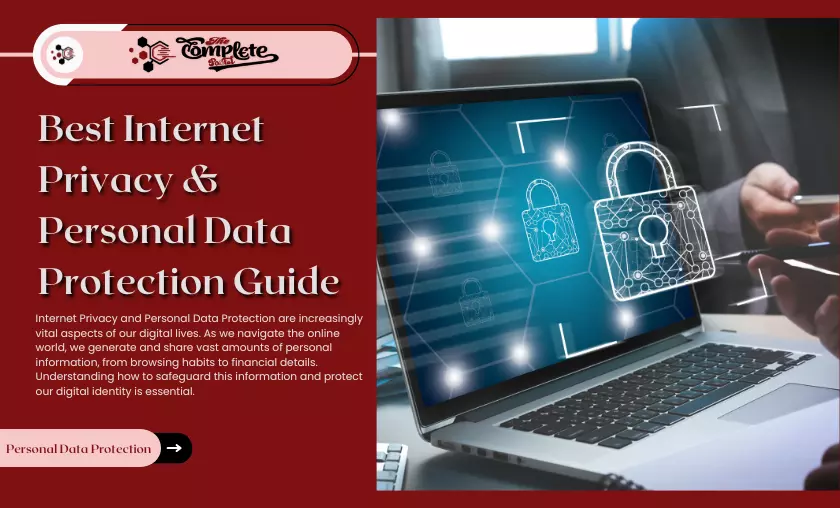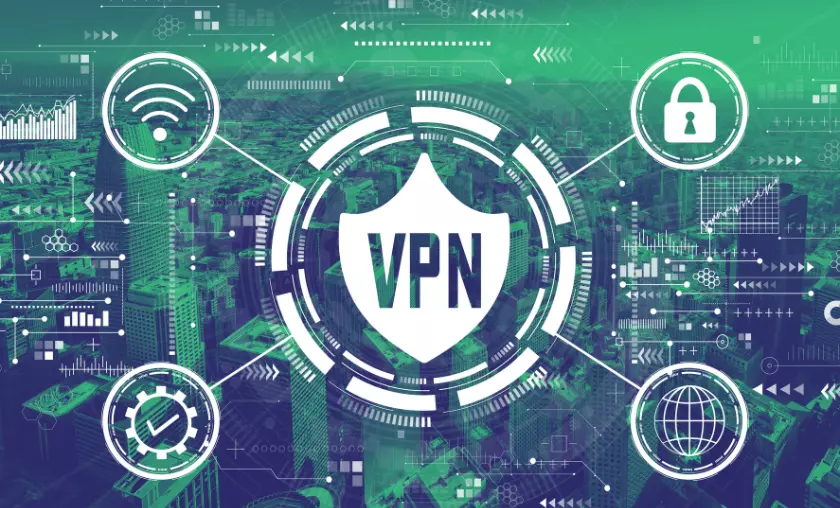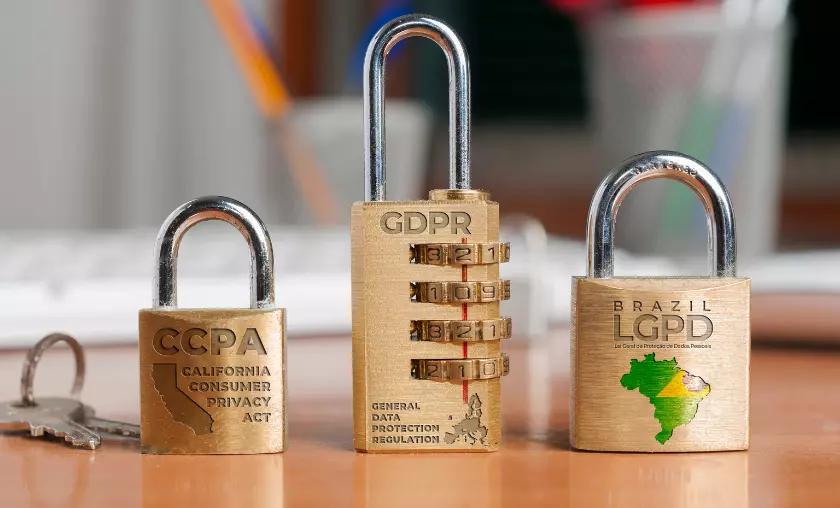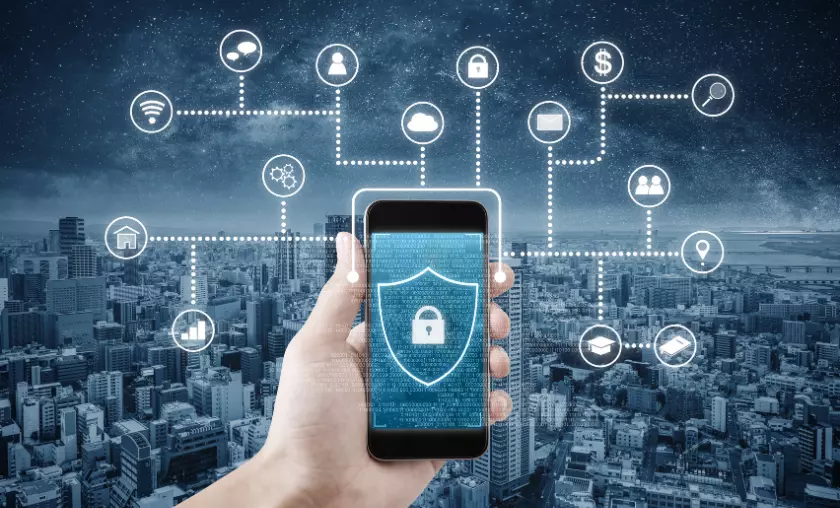
Internet Privacy and Personal Data Protection are increasingly vital aspects of our digital lives. As we navigate the online world, we generate and share vast amounts of personal information, from browsing habits to financial details. Understanding how to safeguard this information and protect our digital identity is essential.
Internet privacy focuses on controlling the data you share and who has access to it, while data protection involves measures to secure this data from breaches and unauthorized access. In a world where data is both a valuable asset and a potential vulnerability, staying informed about privacy and protection practices is crucial for everyone who uses the internet.
Internet Privacy And Personal Data Protection
Protection is Priority
Protecting your personal information online is paramount in today’s digital age. Your sensitive data, such as your financial details, social security number, and even personal conversations, can be vulnerable to cyberattacks, identity theft, and privacy breaches. Cybercriminals are constantly devising new tactics to exploit security weaknesses, and without proper safeguards, you may become a victim.
Safeguarding your personal information is not just about avoiding inconvenience but also about preventing potentially life-altering consequences. It’s essential to practice strong password management, enable two-factor authentication, and be cautious when sharing personal data on websites or with unfamiliar entities to ensure your online safety.
Moreover, the protection of personal information is crucial for maintaining trust in the digital realm. Whether you’re conducting online transactions, communicating with friends and family, or using social media, your data’s security is vital.
Understanding Digital Footprints
Your Online Traces
Your digital footprint refers to the trail of information you leave behind as you engage with the online world. Every click, search, social media post, and online transaction contributes to this footprint. Understanding it is essential because it can reveal a lot about you, from your interests and preferences to more sensitive information like your location and habits.
Being mindful of your digital footprint means taking control of what you share and being cautious about who can access it.
- Browsing History: Your web browser stores a history of the websites you’ve visited, which can reveal your interests and activities.
- Social Media Posts: Information shared on social media, such as your photos, likes, and comments, contributes to your digital footprint.
- Online Purchases: E-commerce transactions can expose your financial details and shopping habits.
- Location Data: Many apps and services collect your location data, creating a record of your movements.
- Search Queries: Search engines track your queries, which can provide insights into your interests and concerns.
In an era where data privacy is a growing concern, being aware of your digital trail is the first step in protecting your online identity and personal information.
Privacy Settings
Navigating Social Media & Platforms
Protecting your privacy in the digital age often begins with managing your privacy settings on social media and various online platforms. Most social networks and apps provide a range of options to control who can see your posts, access your personal information, or track your online behavior. By adjusting these settings to match your comfort level, you can limit the data you share and reduce your online exposure.
- Log In and Access Settings: Sign in to your account on the platform or service you want to adjust. Look for a “Settings” or “Privacy” option in the menu, your profile, or the account dropdown.
- Review Profile Information: Check and modify the information you’ve shared on your profile. This may include your name, email, phone number, and any additional details. Share only what’s necessary.
- Manage Privacy Preferences: Navigate to the privacy settings section. You’ll typically find options related to who can see your posts, who can contact you, and who can look you up using your email or phone number. Customize these settings according to your preferences.
- Review App Permissions: If you use mobile apps or third-party services connected to your account, review the permissions they have. Revoke access to any apps or services that you no longer use or trust.
- Enable Two-Factor Authentication (2FA): Whenever possible, enable 2FA for an extra layer of security. This requires you to enter a temporary code sent to your mobile device or email when logging in, adding significant protection to your account.
It’s essential to regularly review and update these settings as platform policies and your preferences evolve to maintain a better grasp of your digital privacy.
Data Breaches
The Growing Threat to Online Privacy
Data breaches have become an increasingly prevalent threat to online privacy. These incidents involve unauthorized access to sensitive information, such as personal details, passwords, and financial data, which can have severe consequences for individuals and organizations. Hackers and cybercriminals constantly target databases and online platforms, seeking vulnerabilities to exploit.
To protect your online privacy, it’s essential to be cautious and employ strong, unique passwords, enable two-factor authentication when available, and regularly monitor your accounts for any suspicious activity.
Impact of Data Breaches and How to Respond
Additionally, staying informed about data breach news and responding quickly to security notifications can help mitigate potential damage.
VPN Technology
Shielding Your Online Presence
VPN (Virtual Private Network) technology acts as a crucial shield for your online presence. It encrypts your internet connection, making it extremely difficult for hackers, ISPs, or government agencies to snoop on your online activities. This protects your personal data from potential threats and preserves your privacy by masking your real IP address. VPNs are particularly useful when using public Wi-Fi networks, as they add an extra layer of security.
Virtual Private Networks (VPNs) & How They Enhance Privacy
By routing your connection through servers in different locations, VPNs also enable you to access geo-restricted content and maintain anonymity online, making them a valuable tool for safeguarding your digital life.
Cookies & Tracking
Managing Online SurveillanceCookies and tracking are ubiquitous elements of the online experience. Cookies, small files stored on your device, help websites remember your preferences, but they can also be used for tracking your online behavior. Managing online surveillance involves regularly clearing your cookies, using browser settings to limit tracking, and employing browser extensions that block tracking scripts.
- Browser Settings: Most web browsers offer settings that allow you to control cookies. You can block all cookies, block third-party cookies (often used for tracking), or set up exceptions for trusted sites. Check your browser’s privacy settings to make these adjustments.
- Use Private Browsing Mode: Many browsers have a private or incognito mode that doesn’t store cookies, browsing history, or other data after your session ends. This can be useful when you want to prevent websites from tracking your activity.
- Browser Extensions: Numerous browser extensions and add-ons, such as “Privacy Badger” and “Ghostery,” can help you detect and block tracking scripts and cookies. Install these extensions to enhance your online privacy.
- Clear Cookies Regularly: Periodically clear your browser’s cookies and cache. Most browsers allow you to do this from their settings menu. Clearing cookies erases stored data, which can help reduce tracking.
- Use a Virtual Private Network (VPN): A VPN encrypts your internet connection and masks your IP address, making it more challenging for websites to track your online behavior. When you use a VPN, your browsing activity is routed through secure servers, adding an extra layer of privacy.
Additionally, consider using a privacy-focused search engine and browser to reduce your digital footprint. Being proactive in managing cookies and tracking is a fundamental step in protecting your online privacy.
Secure Browsing
HTTPS & Encryption
Secure browsing, facilitated by HTTPS (Hypertext Transfer Protocol Secure) and encryption, is essential for protecting your online privacy. When you visit a website with HTTPS, your data is encrypted as it travels between your device and the site’s server.
This encryption ensures that the data remains unreadable to unauthorized parties even if your internet connection is intercepted. Look for the padlock symbol and “https://” in your browser’s address bar to confirm a secure connection.
Importance of Secure Connections & Encryption
Using secure websites and practicing good encryption helps safeguard sensitive information like login credentials and financial details, enhancing online privacy.
Two-Factor Authentication (2FA)
Strengthening Online Security
Two-factor authentication (2FA) is a robust layer of security that enhances online safety. In addition to your regular password, 2FA requires an additional verification step, typically something you have, like a smartphone or a hardware token. This adds a critical extra barrier to unauthorized access. Even if someone manages to obtain your password, they would still need access to your secondary authentication method to gain entry.
- Enhanced Account Security: 2FA requires a second form of verification, making it much harder for unauthorized users to access your accounts, even if they have your password.
- Protection from Password Theft: Even if your password is compromised, 2FA adds extra security, as attackers would also need access to your authentication device or method.
- Safeguarding Personal Information: 2FA is particularly crucial for accounts that store sensitive personal or financial information, ensuring that your data remains confidential.
- Preventing Unauthorized Access: With 2FA, you receive a unique code on your secondary device, which must be entered correctly to log in. This reduces the risk of someone logging in from an unfamiliar location or device.
- Securing Online Transactions: Many online banking and financial services employ 2FA to verify transactions, adding an extra layer of protection when conducting financial activities online.
2FA is a valuable tool in safeguarding your accounts, especially for sensitive data or services, making it significantly more challenging for cybercriminals to breach your online presence.
Data Privacy Laws
Legal Safeguards for Online Users
Data privacy laws are essential legal safeguards for online users in the digital age. These regulations are designed to protect individuals’ personal information and govern how organizations collect, store, and use data. Examples include the General Data Protection Regulation (GDPR) in Europe and the California Consumer Privacy Act (CCPA) in the United States.
These laws give users more control over their data, allowing them to know what information is being collected and for what purpose. They also require organizations to implement security measures to prevent data breaches.
- Consent and Transparency: GDPR and CCPA require organizations to obtain clear and informed consent from individuals before collecting their personal data. Users must be informed about what data is being collected and for what purposes, ensuring transparency in data processing.
- Data Access and Portability: These regulations grant users the right to access their own data that organizations hold, allowing them to review and verify the accuracy of their personal information. Users can also request that their data be transferred to another service provider.
- Data Deletion (Right to Be Forgotten): GDPR and CCPA empower individuals to request the deletion of their personal data when it’s no longer needed for the purposes it was collected or if they withdraw their consent. This helps users maintain control over their information.
- Data Security Measures: These regulations mandate that organizations implement appropriate security measures to protect personal data from breaches. This includes encryption, access controls, and risk assessments to ensure data remains confidential and secure.
- Penalties for Non-Compliance: GDPR and CCPA have provisions for significant fines and penalties for organizations that fail to comply with the regulations. These penalties serve as a strong deterrent for mishandling personal data, encouraging organizations to take privacy seriously.
Data privacy laws play a crucial role in preserving online privacy and ensuring that individuals’ sensitive information is handled responsibly.
Privacy Best Practices
Safeguarding Your Digital Identity
Protecting your online privacy involves adopting several best practices. Start by regularly reviewing and adjusting your privacy settings on social media platforms and online services. Use strong, unique passwords and consider employing a password manager. Embrace two-factor authentication whenever possible for an added layer of security.
Stay vigilant against phishing attempts and only share personal information on secure websites (look for “https” in the URL). Employ a reputable VPN to encrypt your internet connection, making it harder for prying eyes to monitor your online activities.
Tips & Strategies for Maintaining Internet Privacy & Data Protection
Regularly clear your browser’s cookies and cache to limit tracking. Following these practices can significantly enhance your digital privacy and safeguard your online identity.
Conclusion
In conclusion, the importance of privacy and personal data protection in our increasingly digital world cannot be overstated. This article has underscored the significance of safeguarding personal information for individuals and organizations. As technology advances, so do the risks associated with data breaches and privacy infringements, making it crucial to stay informed and proactive in protecting sensitive information.
Individuals and organizations must collaborate to create a privacy and data security culture. By adopting best practices, staying informed about evolving threats, and advocating for responsible data handling, we can collectively work towards a safer, more privacy-conscious digital world where personal data is treated with the respect and protection it deserves.
FAQ’s
What Should I Do if I Suspect a Breach of My Personal Data or Privacy?
If you suspect a breach of your personal data or privacy, take immediate action by changing passwords, reporting the incident to the relevant authorities, and monitoring your accounts for suspicious activity. Additionally, consider seeking legal advice or contacting consumer protection agencies for assistance in addressing the breach.
How Can Organizations Ensure Compliance With Data Protection Regulations?
Organizations can ensure compliance with data protection regulations by appointing a Data Protection Officer, implementing data protection policies and procedures, conducting privacy impact assessments, and regularly training employees on data protection best practices.
What Rights Do Individuals Have Regarding Their Personal Data?
Individuals have rights to access, correct, and delete their personal data, as well as the right to be informed about how their data is processed and the right to data portability in some cases. These rights are often protected by data protection laws such as GDPR.
How Do Data Breaches Occur, and How Can They Be Prevented?
Data breaches occur through various means, including hacking, malware, and human error. Preventing them involves implementing robust cybersecurity measures, conducting regular security audits, educating employees about security best practices, and complying with data protection regulations.
What is GDPR, and How Does It Impact Personal Data Protection in Europe?
GDPR, or the General Data Protection Regulation, is a European Union regulation that enhances data protection and privacy rights for EU citizens. It requires organizations to obtain consent for data processing, allows individuals to access and control their data, and imposes significant penalties for data breaches.
To Read More Similar Articles, Click Here.
Thanks for Visiting Our Website. If You Appreciate Our Work, Kindly Show Us Some Support in Our Comments Section 🙂


